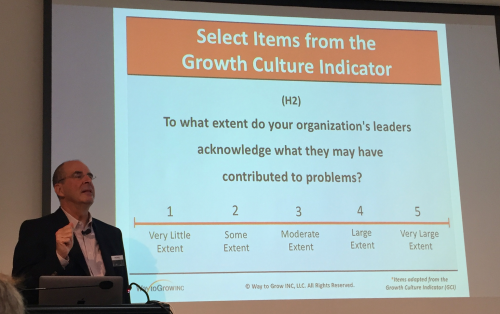
Harvard professor Dr. Robert Kegan says:
“Let’s be blunt: In the ordinary organization, nearly everyone is doing a second job no one is paying them for — namely, hiding their weaknesses, looking good, covering their rear ends, managing other people’s favorable impression of them. This is the single biggest waste of a company’s resources.”
And the way I look at it is that the better they are at that second job, the more dysfunctional the management teams become…
So what to do about it? How to stop the madness?
Again, according to Kegan, it requires a different mindset, a culture that goes something like this:
“We hired you because we thought you were good, not because we thought you were perfect. We are all here to get better, and the only way we will get better is to make mistakes, reveal our limitations, and support each other to overcome them.”
And that, says Kegan, is the starting point. That is the basic foundation of how to create what he and co-author Dr. Lisa Lahey have labelled the DDO a Deliberately Developmental Organization in their book: An everyone culture.
In that culture, we would not need to spend time on our second job at all but would use the time more productively to develop ourselves each other and the organisation. This is not as utopian as you might think, but it definitely requires a hard ‘ RESET’ of how the team interacts with each other.
A good place to start might be to go off-site for 2-3 days and agree on a new set of ground rules for collaboration development and growth. There are various ways to do that. One of my favourite frameworks is using Peter Blocks six conversations as the agenda for the retreat.
- Invitation conversation. Transformation occurs through choices, not mandates. Invitation is the call to create an alternative future. What is the invitation we can make to support people to participate and own the relationships, tasks, and process that lead to success?
- Possibility conversation. This focuses on what we want our future to be as opposed to problem-solving the past. It frees people to innovate, challenge the status quo, break new ground and create new futures that make a difference.
- Ownership conversation. This conversation focuses on whose organization or task is this? It asks: How have I contributed to creating current reality? Confusion, blame and waiting for someone else to change are a defense against ownership and personal power.
- Dissent conversation. This gives people the space to say no. If you can’t say no, your yes has no meaning. Give people a chance to express their doubts and reservations, as a way of clarifying their roles, needs and yearnings within the vision and mission. Genuine commitment begins with doubt, and no is an expression of people finding their space and role in the strategy.
- Commitment conversation. This conversation is about making promises to peers about your contribution to the success. It asks: What promise am I willing to make to this enterprise? And, what price am I willing to pay for success? It is a promise for the sake of a larger purpose, not for personal return.
- Gifts conversation. Rather than focus on deficiencies and weaknesses, we focus on the gifts and assets we bring and capitalize on those to make the best and highest contribution. Confront people with their core gifts that can make the difference and change lives.
In my experience, it is well worthwhile to have a person who is not part of the team facilitate these conversations. So that each team member can participate freely without having another job to as well.
On the first evening, I also like to add a Life Map exercise in addition to the Six Conversations. After dinner, each participant takes 15-20 minutes to reflect on the path they have come along in life. They draw that as a graph or map using a template (you can have a copy by simply entering your email below). Once everyone has completed the Life Map, they take turns sharing their story using the life map as the guide. This ALWAYS produces a much better understanding of why each of us is who we are. And ultimately that contributes to higher levels of trust in the group.
I also recomend the book: Community The Structure of Belonging By Peter Block
[…] After the reset, then what? We reset the management team and cleared the air using the workshop framework I described in my previous blog post. […]